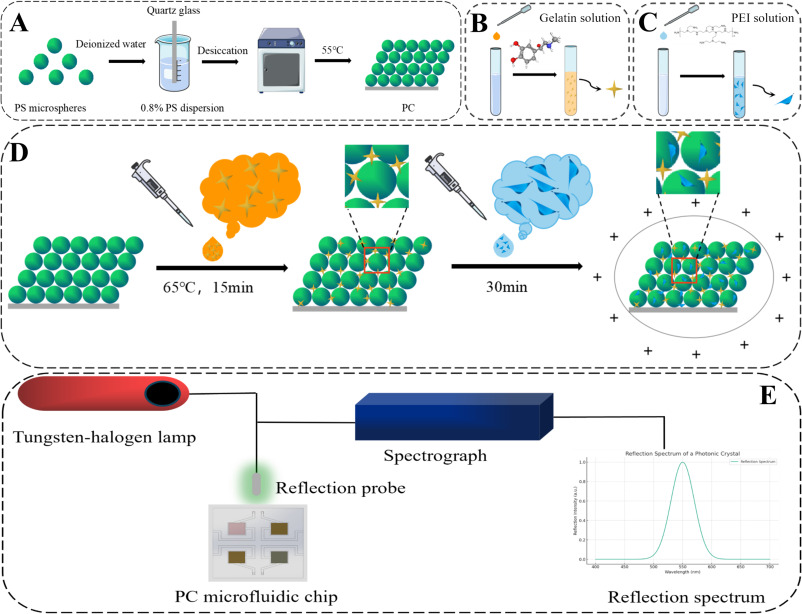近日,我校工学院油菜机械化生产技术与装备团队廖庆喜教授、彭望副教授研究成果在期刊Food Chemistry上发表了题为“Polyethylene imine-modified photonic crystal microfluidic chip for highly sensitive detection of microbial spores”的研究论文。
在作物环境监测和食品安全领域,微生物孢子的快速准确检测一直是研究的热点。传统的生物控制剂检测方法存在周期长、操作复杂、成本高以及灵敏度不足等问题,这些问题限制了其在实际应用中的效率和普及。因此,开发一种新型、高效的微生物孢子检测技术显得尤为重要。
本研究提出了使用聚乙烯亚胺(PEI)修饰的光子晶体微流控芯片,用于高灵敏度检测油菜微生物孢子。该芯片通过结合明胶分子,赋予光子晶体优异的光热稳定性和水溶液中的高稳定性。光子晶体表面通过PEI赋予正电荷,增强了孢子的吸附能力。研究成功实现了对盾壳霉孢子和淡紫紫孢菌孢子的高效富集,其决定系数分别为0.963和0.971,检测范围从102到106孢子/ml,且光子晶体表现出良好的重复使用性。该技术能够实现病原微生物的快速、无损和高精度检测。对于预防和控制由微生物孢子引起的疾病和污染具有重要意义。

PEI修饰光子晶体微流控检测原理
华中农业大学工学院彭望副教授为论文的第一作者,2022级硕士研究生张远凯为学生第一作者,工学院廖庆喜教授为论文共同通讯作者,2022级硕士研究生易超为参与作者,华中农业大学为第一完成单位。
【英文摘要】
To address the lengthy cycles, complex operations, high costs, and insufficient sensitivity of biomarker detection in traditional biological control agents, photonic crystal treated with PEI was developed for highly sensitive detection of Sclerotinia sclerotiorum microbial spores. By incorporating gelatin molecules, photonic crystal is endowed with excellent photothermal stability and high stability in aqueous solutions. The photonic crystal surface is conferred a positive charge by PEI, which can be used to enhance the adsorption of spores. Efficient enrichment of Sclerotinia sclerotiorum and Purpureocillium lilacinum spores is achieved, with coefficients of determination 0.963 and 0.971, respectively. The detection range is from 102 to 106 spores/ml, and the photonic crystal exhibited good reusability. The prepared photonic crystal enables rapid, non-destructive, and accurate quantitative detection of microbial spores.
